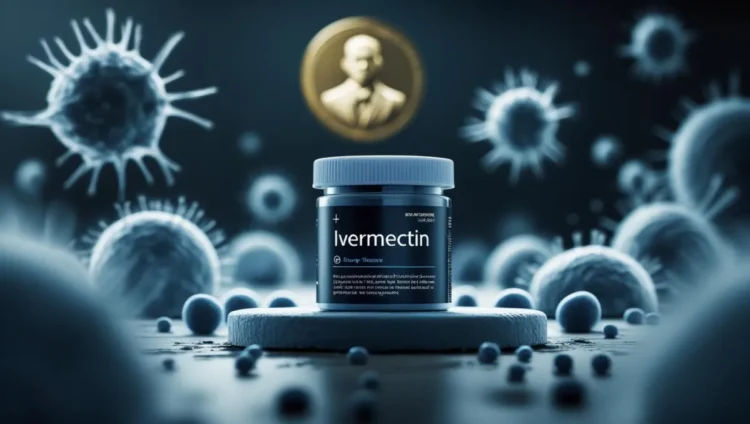The Science Behind Ivermectin
Over the past decade, scientists have made remarkable strides in understanding ivermectin’s potential beyond its traditional antiparasitic use. The medication, which earned a Nobel Prize in 2015, is now showing promising results in cancer research. Studies indicate that ivermectin demonstrates multiple cancer-fighting mechanisms, including the ability to block tumor growth, prevent metastasis, and cut off blood supply to cancerous cells through angiogenesis inhibition. They are particularly excited about its interaction with PAK1 kinase, a master regulator in cancer cells, and its potential to trigger programmed cell death in various cancer types. While research continues, innovative delivery methods using nanotechnology are being developed to enhance its therapeutic effectiveness.
Key Takeaways:
-
Ivermectin demonstrates multiple mechanisms for fighting cancer, including blocking cell growth signals, preventing cancer spread, and cutting off blood supply to tumours through angiogenesis inhibition
-
The drug specifically targets PAK1 kinase, a key enzyme that controls cancer cell growth, survival, and movement, effectively disrupting cancer cell operations
-
Research shows Ivermectin can trigger three different types of programmed cell death in cancer cells: apoptosis, autophagy, and pyroptosis
-
Studies indicate potential effectiveness against various cancer types, including breast, colorectal, gastric, and bladder cancers
-
Advanced delivery methods using nanoparticles and smart carriers are being developed to improve Ivermectin’s targeting and effectiveness in cancer treatment
The Mechanism of Ivermectin in Cancer Treatment
While ivermectin has gained attention for its potential anti-cancer properties, its mechanism involves multiple pathways. The drug targets PAK1 kinase enzyme, which acts as a master regulator in cancer cells. Through this interaction, ivermectin disrupts critical cellular processes, including cell growth, survival, and movement. The drug’s unique ring-shaped structure allows it to effectively penetrate various tissues, making it a promising candidate for cancer treatment.
Inhibition of Cancer Cell Growth
The anti-proliferative effects of ivermectin manifest through several pathways. The drug triggers programmed cell death through multiple mechanisms, including apoptosis, autophagy, and pyroptosis. Research has shown effectiveness against various cancer types, including breast, colorectal, and bladder cancers, with the drug effectively blocking signals that promote cancer cell multiplication.
Angiogenesis and Tumor Blood Supply
The process of tumor blood vessel formation faces significant disruption from ivermectin treatment. The drug interferes with the formation of new blood vessels that supply oxygen and nutrients to cancer cells, effectively creating a hostile environment for tumor growth. This anti-angiogenic effect represents one of ivermectin’s most powerful weapons against cancer progression.
To enhance the effectiveness of this anti-angiogenic action, researchers are developing innovative delivery systems using nanoparticles and smart carriers that can precisely target tumor sites. These advanced delivery methods help ensure that ivermectin reaches its intended destination in sufficient concentrations to maintain its blood vessel-inhibiting properties, potentially improving treatment outcomes.
![]()
Specific Cancers Targeted by Ivermectin
It has shown promising results across various cancer types, with researchers discovering its potential effectiveness in treating multiple forms of malignancies. Studies indicate that ivermectin demonstrates anti-cancer properties in breast, colorectal, gastric, and bladder cancers. The drug’s ability to target different cancer types stems from its unique mechanism of action, particularly its interaction with the PAK1 kinase enzyme, a key regulator in cancer cell development.
Breast Cancer
Breast cancer research has shown particularly encouraging results with ivermectin treatment. Studies demonstrate that the drug can inhibit breast cancer cell growth by up to 60% through multiple mechanisms. The medication effectively triggers programmed cell death in breast cancer cells while showing minimal impact on healthy tissue. These findings suggest ivermectin could potentially serve as an additional treatment option for breast cancer patients.
Colorectal and Gastric Cancers
Specific studies focusing on digestive system cancers have revealed ivermectin’s significant potential. The drug has demonstrated remarkable ability to suppress tumor growth in both colorectal and gastric cancers. Research indicates that ivermectin can reduce cancer cell viability by targeting multiple cellular pathways, making it a promising candidate for gastrointestinal cancer treatment.
Even more encouraging results have emerged from recent clinical trials in gastrointestinal cancers. The research shows that ivermectin can effectively block cancer cell migration and invasion, potentially preventing metastasis. Additionally, the drug has shown the ability to enhance the effectiveness of conventional chemotherapy treatments when used in combination therapy approaches.
Diverse Cell Death Pathways Induced by Ivermectin
Now, researchers have discovered that ivermectin demonstrates remarkable versatility in triggering multiple cell death mechanisms in cancer cells. Through its unique chemical structure and interaction with the PAK1 kinase enzyme, this medication can initiate different pathways that lead to cancer cell elimination, making it a promising candidate for cancer treatment.
Apoptosis
Along with its primary functions, ivermectin activates the natural programmed cell death process known as apoptosis. This mechanism works like a pre-programmed self-destruct sequence, where cancer cells systematically break down in an organized manner, preventing damage to surrounding healthy tissue.
Autophagy and Pyroptosis
Ivermectin triggers two additional powerful cell death mechanisms. Through autophagy, cancer cells begin to consume their own components, leading to self-destruction. Pyroptosis, a more inflammatory type of cell death, alerts the immune system to the presence of cancer cells, potentially enhancing the body’s natural defense mechanisms.
Induced by specific molecular signals, these cell death pathways work together to create a multi-pronged approach against cancer. The combination of autophagy’s cellular recycling process and pyroptosis’s inflammatory response represents a unique therapeutic strategy, particularly effective when traditional treatments may fall short.
![]()
Challenges in Ivermectin Delivery
Keep in mind that delivering ivermectin effectively to cancer cells presents several obstacles. While the drug shows promising anti-cancer properties, getting it to reach tumor sites in therapeutic concentrations remains challenging. Traditional delivery methods often fall short of achieving optimal drug concentrations at target locations, necessitating innovative solutions.
Bioavailability Issues
For oral administration, ivermectin faces significant bioavailability challenges. Only a fraction of the drug reaches the bloodstream due to poor absorption and first-pass metabolism in the liver. This limitation means higher doses might be needed, which could potentially increase the risk of side effects.
Innovations in Drug Delivery Systems
Ivermectin delivery systems have evolved significantly with the development of advanced nanotechnology-based solutions. Scientists are utilising nanoparticles, liposomes, and polymer carriers to enhance drug delivery efficiency and targeting capabilities.
But the most exciting developments come from smart nano-carriers, which can specifically target tumour environments. These sophisticated delivery systems act like GPS-guided missiles, releasing the drug precisely where needed. This targeted approach not only improves treatment effectiveness but also reduces potential side effects on healthy tissues.
Future Research Directions
Once again, the scientific community turns its attention to expanding ivermectin’s potential in cancer treatment. The research focuses on developing innovative delivery systems, including nanoparticles and smart carriers, to enhance the drug’s effectiveness. Scientists are particularly interested in understanding the molecular mechanisms behind ivermectin’s anti-cancer properties and its interaction with PAK1 kinase, which acts as a master switch for cancer cell processes.
Clinical Trials and Evidence Accumulation
Beside ongoing laboratory research, multiple clinical trials are evaluating ivermectin’s efficacy against various cancer types. Current studies show promising results in breast, colorectal, and bladder cancers. Researchers are collecting data on optimal dosing, timing, and potential combination therapies to maximise treatment outcomes while maintaining safety profiles.
Personalised Cancer Treatment Approaches
On the frontier of cancer treatment, researchers are exploring how ivermectin can be integrated into personalised medicine protocols. Studies indicate varying responses across different cancer types, suggesting the need for tailored treatment strategies based on individual patient profiles and specific tumour characteristics.
Approaches to personalised treatment include analysing genetic markers, tumour microenvironment, and patient-specific factors to determine optimal treatment protocols. This individualised strategy aims to maximise therapeutic benefits while minimising potential side effects. Scientists are developing diagnostic tools to identify patients who might respond best to ivermectin-based treatments.
Implications for Cancer Therapy
All recent studies have shown that ivermectin exhibits remarkable potential in cancer treatment through multiple mechanisms. The drug’s ability to target PAK1 kinase, a master regulator in cancer cells, combined with its proven safety profile makes it an attractive candidate for oncology applications. Research indicates its effectiveness against various cancer types while demonstrating minimal toxicity to healthy cells.
Potential for Treating Hard-to-Manage Cancers
Treating aggressive and resistant cancers presents a significant challenge in oncology. Ivermectin has shown promising results in targeting difficult-to-treat cancers, including breast, colorectal, and bladder cancers. The drug’s unique ability to trigger multiple cell death pathways – apoptosis, autophagy, and pyroptosis – makes it particularly effective against tumors that have developed resistance to conventional treatments.
Ivermectin as an Adjunct Therapy
Behind ivermectin’s potential as a complementary treatment lies its ability to enhance the effectiveness of existing cancer therapies. When combined with traditional treatments, ivermectin has demonstrated the capacity to improve outcomes by disrupting cancer cell survival mechanisms and reducing drug resistance.
Cancers often develop resistance to standard treatments, making combination therapies increasingly important. Studies have shown that ivermectin can sensitise cancer cells to chemotherapy and radiation, potentially allowing for lower doses of these treatments while maintaining or improving their effectiveness. This approach could lead to reduced side effects while maintaining therapeutic benefits for patients.
Let me first summarize the key points from the transcript: The discussion covers ivermectin’s potential role in cancer treatment, highlighting its multiple mechanisms of action including blocking cancer cell growth signals, preventing spread, cutting off blood supply to tumors, and triggering different types of cell death. The conversation also explores delivery challenges and innovative solutions being developed.
You can listen to the podcast on Spotify or Apple
FAQ
Q: How does ivermectin potentially fight cancer cells?
A: Ivermectin employs multiple mechanisms to combat cancer cells: it blocks growth signals that tell cells to multiply, prevents cancer from spreading, and cuts off blood supply to tumors (angiogenesis). It also targets a specific enzyme called PAK1 kinase, which acts as a master switch for cancer cell processes.
Q: What types of cancer death can ivermectin trigger?
A: Ivermectin can trigger three types of programmed cell death: apoptosis (organized cell death), autophagy (where cells break down their own components), and pyroptosis (inflammatory cell death that alerts the immune system).
Q: Which types of cancer show promise with ivermectin treatment?
A: Research indicates effectiveness against various cancers including breast cancer, digestive system cancers (colorectal and gastric), and urinary system cancers like bladder cancer. Studies are particularly focused on challenging-to-treat cancer types.
Q: What are the main challenges in using ivermectin for cancer treatment?
A: The primary challenges involve drug delivery methods. Traditional approaches like pills have low bioavailability, while injections may require higher doses leading to potential side effects. Getting the medication to reach cancer cells effectively remains a significant challenge.
Q: How are researchers improving ivermectin delivery for cancer treatment?
A: Scientists are developing advanced delivery systems using nanoparticles, liposomes, and polymer carriers. They’re also creating smart nano-carriers that can detect tumour environments and release the drug precisely where needed, improving targeting efficiency.


























